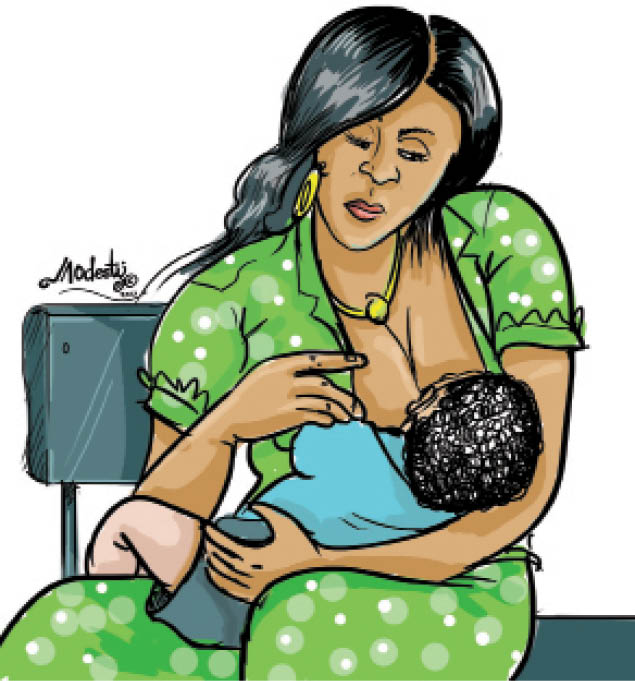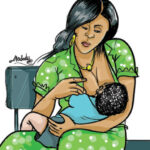Hassana Usman,35, brought her 20- month-old infant to the Primary Healthcare Centre in Bulkachuwa town of Katagum Local Government Area of Bauchi State.
The infant who is her eighth child was suffering from diarrhoea and vomiting since he was weaned from breast milk about two months ago.
She said all her previous seven children experienced the same fate after being weaned from breast milk, as she never practised exclusive breastfeeding for any of her children.
She said her mother-in-law did not allow her to practise exclusive breastfeeding for any of her children.
NIGERIA DAILY: What FCT Residents Feel About Wike’s Demolition Threat
NIGERIA DAILY: What FCT Residents Feel About Wike’s Demolition Threat
“We are staying at a family house together with the parents of my husband. When my fifth child suffered from diarrhoea and vomiting, the health workers advised me to practise exclusive breastfeeding for my subsequent children.
“So, when I gave birth to my sixth child, I informed my husband about my intention and he initially agreed but after he told his mother, she outrightly rejected the idea.
“She told him that it is inhuman to deny an infant water, saying he (my husband) is still alive and healthy, although she never practised such ‘evil’,” Hassana narrated.
As a result of her sixth, seventh and eighth birth, she followed the same pattern of having ailments after they are weaned from breast milk, and gradually get back on their feet after receiving medication.
She added, “We started giving them water a few days after they were born and weaned them from breast milk after 18 months. Even though we are aware of it, we cannot practise it because our husbands and in-laws are not supportive of us.”
Another mother, Zainab Salisu, a mother of five, said her husband cannot stand to see their child crying and refused to be given water.
“He would say that he is a child and cannot speak to say he needs water. Also, I have never seen my parents doing it, likewise my mother-in-law whom we are staying with, and we were also brought up that way, so there is no harm in doing the same thing.
Maryam who is in her mid-thirties, said she has seen the benefit of exclusive breastfeeding from her neighbour’s children who hardly fall sick, adding, “But there is nothing I can do about it. Even if I agree to do it, my husband will not allow that.”
She however believes that if elders and husbands are sensitised on the importance of exclusive breastfeeding, mothers would find it easier to practise without interference.
Another mother, Saratu Shehu, said she went through a lot of physical and psychological torture for introducing exclusive breastfeeding to her children.
She said living in the same compound with her mother-in-law and some of her husband’s siblings, worsened her situation.
She said, “When I told my mother-in-law about my intentions to exclusively breastfeed my child, I became the subject of jokes. At a point, I was physically assaulted despite my precarious health condition in the aftermath of my delivery.
“When the threat on my life became unbearable, I had to leave for my parents’ house where I stayed until after six months. Luckily for me, my husband is on my side on the issue.
“But one thing that became apparent was that after six months of exclusive breastfeeding, even my mother-in-law was showering praises on me for caring for the baby, but I couldn’t tell her that it was because of the exclusive breastfeeding.”
Daily Trust learnt that despite the challenges, some mothers are still practising exclusive breastfeeding because of the apparent benefits.
Maryam Abdulkadir, a mother of two and resident of Bulkachuwa town, said,
She practised exclusive breastfeeding and even advocated for other women to do the same because of the many benefits.
“My first daughter is in primary three. And she is very good in school and always brought good results home. She rarely falls sick like other children of our neighbours, whom diseases like measles, diarrhoea, and other illnesses bedevilling.
She advocated for extended maternity leave for nursing mothers, to encourage women to embrace the exclusive breastfeeding practice.
She said the lack of good and nutritious food to eat, in most houses, especially in the rural areas, is also a problem. Not all women have access to good food that can help them produce enough breast milk for their infants.
“Therefore, men have a role to play here, to ensure that their wives are well fed to produce the quality and quantity of breast milk, to exclusively breastfeed their children,” she advised.
She added that she overcame the challenge of parents’ interference, because her husband is a health worker, saying he was able to convince his parents to allow her to practise exclusive breastfeeding.
The man in charge of Bulkachuwa Primary Healthcare Centre, Musa Samaila Madaci, lamented elders’ interference was discouraging nursing mothers from practising exclusive breastfeeding.
“Especially in the rural areas, our people still find it difficult to understand not mixing breast milk with water. But what we always remind them is, for instance, if a child’s stomach is 100 millilitres, by giving him water first, the mother has already filled his stomach with water and he or she will have a small portion remaining for the breast milk. So, if that child needs 100 millilitres of milk, he will only get about 60 per cent which is not enough for both physical and mental growth.”
Madaci said coercion would not solve the problem, adding that government should continue to enlighten women through the Ward Development Committees (WDCs) and other support groups to educate traditional and religious leaders on the importance of the exclusive breastfeeding. “If these people accept it, it will be easier for the communities to accept the practice,” he said.
The health worker complained that malnutrition on the part of the mother also negatively affects exclusive breastfeeding practice.
He added that more women are embracing exclusive breastfeeding because they now believe that mixing breast milk with other formulas exposes children to diarrhoea and other ailments.
Musa Madaci called for the establishment of creches to encourage nursing mothers to breastfeed in workplaces. “Culturally and religiously, it helps women and gives them more privacy and encourages them to embrace the practice,” he said.
He also called on parents to understand the importance of embracing the practice. “Children that are exclusively breastfed are healthier than those who are not. Also, the money that might be used to treat the child for childhood illnesses will be used to cater for the grown-up children,” he said.
The Director of the Health Department at the Katagum Local Government Council, Jibrin Mohammed Inuwa, said whenever health officers from the LGAs go to the service delivery point, they advocate for exclusive breastfeeding up to six months after birth.
He said there is another group called ‘Mama-to-Mama,’ that is being sponsored by the United Nations Children’s Fund (UNICEF) and has received training to carry out awareness creation across households in Katagum LGA.
“UNICEF has also assisted us with Voluntary Community Mobilisers (VCFs). They go around households to sensitise parents, effecting behavioural change in people and exclusive breastfeeding is one of the key priority areas of their assignment.
According to UNICEF, babies not breastfed are 14 times more likely to die before they reach their first birthday than those exclusively breastfed.
The Chief of Field Office, UNICEF, Bauchi Office, Dr Tushar Rane, in a remark at a one-day Media Dialogue to commemorate the 2023 World Breastfeeding Week in Azare, Bauchi State, advocated for six months of paid maternity leave for working nursing mothers, as part of efforts to improve workplace policies to boost breastfeeding.
He said nursing mothers need regular lactation breaks during working hours and adequate facilities that will enable them to continue exclusive breastfeeding for six months.
“Workplaces challenges to breastfeeding are one of the primary factors responsible for early cessation of breastfeeding. Women require sufficient time and support to breastfeed successfully. For working mothers, juggling between tasks and breastfeeding may be nearly often impossible,” he said.
The chief of field, Bauchi field office, stated that World Breastfeeding Week is celebrated every year to reiterate the importance of breastfeeding for children, mothers, and socio-economic development, adding that, “Breast milk is the first vaccine for every child.”

 Join Daily Trust WhatsApp Community For Quick Access To News and Happenings Around You.
Join Daily Trust WhatsApp Community For Quick Access To News and Happenings Around You.

